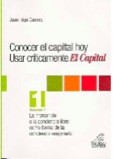TABLE OF CONTENTS
– Preface
- The question
- Cognition and recognition
Part I. The commodity or the simplest form of alienated consciousness
– Chapter 1. The reason for being of value or price according to political economy
– Chapter 2. The commodity as social relation
- The starting point of the Critique of Political Economy: The social specificity of the commodity
- The source of value of commodities
- The form of value
- The unity of the process of social metabolism established through the form of value of the product of social labor performed in a private manner
– Chapter 3. The consciousness of commodity producers, i.e., the free consciousness that is the concrete form of alienated consciousness
– Chapter 4. The naturalization of free consciousness, i.e., commodity fetishism
From the practical consciousness to psychoanalytical theory
- The practical consciousness of commodity producers
- The scientific consciousness of commodity producers that starts by naturalizing its freedom
- Psychoanalytical theory
- Freud
- Lacan
– Chapter 5. The naturalization of free consciousness, i. e., commodity fetishism
Political economy
- Classical political economy
- Neoclassical economics
- Neo-Ricardian political economy
- Sraffa
– Chapter 6. The naturalization of free consciousness, i. e., commodity fetishism
Marxist political economy
- The Marxist political economy that conceives as being natural that which only belongs in the specific social form taken by human labor in the capitalist mode of production
- Cockshott y Cottrell
- Seton
- Foley
- Steedman
- Sweezy
- Mandel
- The substitution of the real determination of value by the ‘concept of value’
- The path from the ‘concept of value’ to the Neoclassical conceptions
- El marxismo analítico (Roemer)
- Lange
- The Marxist political economy that conceives as a specific social form of the capitalist mode of production that which belongs in the materiality of human labor
- The USSR Academy of Science
- From socialist markets to market socialism
- Shaikh
- Benetti
- Elson
- Murray
- Postone
- Rubin
- ´Value form’ Marxism (Reuten)
- Autonomist Marxism (De Angelis)
- Holloway
- Hilferding
- From political economy to Marxist philosophy
- Lukács
- The alienated consciousness that negates itself as such by knowing itself in its historical specific determination
- The alienated consciousness that remains the prisoner of its alienation as the pure critique of the latter, i.e., once again on Marxist philosophy
- Althusser
- Sartre
- The necessity of the alienated consciousness that advances in its freedom by knowing itself in its alienation
Parte I. The critical use of Capital as a guide for the process of recognition
– Chapter 8. The commodity
- The two factors of a commodity: use value and value (the substance of value and the magnitude of value)
- The twofold character of the labor embodied in commodities
- The form of value or exchange value
- The fetishism of commodities and the secret thereof
SUMMARY
¿Leer El Capital? ¿Será cuestión de interpretar el texto en su unidad? ¿Lograremos enfocarlo de manera objetiva si seguimos la indicación de buscar en él su «Lógica (con mayúscula)»? ¿Y si sacamos a El capital de la condición de objeto de nuestra lectura y constituimos a nuestra necesidad de leerlo en el objeto del cual El Capital debe dar cuenta? En El Capital, Marx despliega por primera vez en la historia la reproducción en el pensamiento de la necesidad que determina la razón histórica de existir del modo de producción capitalista y a la acción de la clase obrera como la portadora de la superación revolucionaria del mismo en el desarrollo de la comunidad de los individuos libremente asociados; es decir, de los individuos capaces de regir su acción por conocer objetivamente sus propias determinaciones más allá de toda exterioridad aparente. A partir de El Capital, toda reproducción en el pensamiento que avance sobre las determinaciones desplegadas en él, es un proceso de reconocimiento desde el punto de vista social. Pero no se trata de leer El Capital; ni siquiera de estudiarlo. Se trata, verdaderamente, de enfrentar por nosotros mismos a las formas reales del capital para conocerlas, con la potencia que adquirimos al disponer de la reproducción ideal de las mismas desarrollada en El Capital. El presente libro se desarrolla en dos secciones. La primera refleja el curso que va siguiendo el proceso de conocimiento del autor a medida que avanza sobre las formas concretas que enfrenta. La segunda refleja la naturaleza del proceso de reconocimiento desde el punto de vista social, donde la propia búsqueda analítica y posterior despliegue de la necesidad van mostrando cómo avanzan encontrando su guía en el conocimiento ya existente, en tanto se enfrentan al mismo concreto que éste. El presente volumen constituye el primer paso en el desarrollo de la obra. Avanza sobre las determinaciones de la mercancía hasta reconocerla en su condición de forma más simple que toma la relación social general en el modo de producción capitalista. Lo cual equivale a decir que este primer paso avanza hasta reconocerse a sí mismo como expresión de la conciencia que se afirma en su libertad, no por negar abstractamente sus determinaciones, sino por conocer su necesidad en cuanto ésta la determina como una conciencia enajenada en las potencias sociales de su propio producto material.
DOWNLOAD PDF (Only available in English: Preface, Chapter 1, 2, 3 and 5 / Translated by Leonardo Kosloff)

